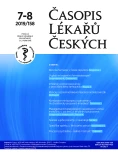Is safe pharmacotherapy worthwhile?
Authors:
Kateřina Langmaierová 1,3; Jana Gregorová 2,3
Authors‘ workplace:
Oddělení klinické farmacie, Krajská zdravotní, a. s., Ústí nad Labem, pracoviště Teplice
1; Oddělení klinické farmacie, Nemocnice Na Bulovce, Praha
2; Ústav aplikované farmacie, Farmaceutická fakulta VFU, Brno
3
Published in:
Čas. Lék. čes. 2019; 158: 270-272
Category:
Review Article
Overview
The safety of pharmacotherapy can be monitored at different levels of the health system and the quality of health care provided can be assessed from different points of view. The Ministry of Health, the health insurance companies, the State Institute for Drug Control, the Institute of Health Information and Statistics, and the health care facilities themselves fulfill their roles. Safety is assessed differently at each level. Based on current knowledge, it follows that the monitoring of adverse effects is not only of safety but also of economic importance for health care facilities. At this point the proactive way of working of clinical pharmacist can play a major role specifically when they get involved in direct care of the patient.
Keywords:
clinical pharmacist – safety of pharmacotherapy – Adverse reactions
Sources
- Věstník MZ ČR 2012; 5.
- Ministerstvo zdravotnictví ČR. Resortní bezpečnostní cíle. MZ ČR, Praha, 2012.
- Zákon č. 372/2011 Sb., o zdravotních službách a podmínkách jejich poskytování.
- Vyhláška č. 102/2012 Sb., o hodnocení kvality a bezpečí lůžkové zdravotní péče.
- Prokeš M. Hodnocení kvality preskripce. Klinická farmakologie a farmacie 2008; 22 : 118–122.
- Státní ústav pro kontrolu léčiv. www.sukl.cz
- Pokorná A, Štrombachová V, Mužík J et al. Národní portál Systém hlášení nežádoucích událostí. Ústav zdravotnických informací ČR, Praha, 2016.
- Gyllensten H, Rehnberg C, Jonssön AK et al. Cost of illness of patient-reported adverse drug events: a population-based cross-sectional survey. BMJ Open 2013, 3(6), e002574.
- Szkultecka-Debek M, Drozd M, Kiepurska N et al. An adverse events potential costs analysis based on Drug Programs in Poland. Dermatology focus. Curr Issues Pharm Med Sci 2014; 27 : 183–186.
- Lagnaoui RN, Moore J, Fach M et al. Adverse drug reactions in a department of systemic diseases-oriented internal medicine: prevalence, incidence, direct costs and avoidability. Eur J Clin Pharmacol 2000; 56 : 181–186.
- Giardina C, Cutroneo PM, Moccario E et al. Adverse drug reactions in hospitalized patients: results of the FORWARD (Facilitation of Reporting in Hospital Ward) Study. Front Pharmacol 2018; 9 : 350.
- Mladá, J. Nežádoucí účinky léčivých přípravků – proč se jimi zabývat? Urologie pro praxi 2010; 11 : 108–109.
- Gregorová J et al. Význam klinickofarmaceutické péče. In: Gregorová J, Langmaierová K. Klinickofarmaceutická péče v České republice: Popis aktuálního stavu a stanovení cílů. Maxdorf, Praha, 2019 : 31–34.
- Rychlíčková J, Šaloun J, Gregorová J. Evaluation of clinical pharmacists' interventions in the Czech Republic. Pharmacotherapy 2016; 36 : 766–773.
Labels
Addictology Allergology and clinical immunology Angiology Audiology Clinical biochemistry Dermatology & STDs Paediatric gastroenterology Paediatric surgery Paediatric cardiology Paediatric neurology Paediatric ENT Paediatric psychiatry Paediatric rheumatology Diabetology Pharmacy Vascular surgery Pain management Dental HygienistArticle was published in
Journal of Czech Physicians

- Advances in the Treatment of Myasthenia Gravis on the Horizon
- Possibilities of Using Metamizole in the Treatment of Acute Primary Headaches
- Metamizole vs. Tramadol in Postoperative Analgesia
- Spasmolytic Effect of Metamizole
- Metamizole at a Glance and in Practice – Effective Non-Opioid Analgesic for All Ages
-
All articles in this issue
- Clinical pharmacy in the Czech Republic
- Is safe pharmacotherapy worthwhile?
- Specialization in clinical pharmacy
- Paediatric clinical pharmacist: a potential benefit?
- Drug administration via feeding tubes: examples, working group
- Proton pump inhibitors from clinical pharmacist’s point of view
- Clinically significant drug interactions of antiretrovirals
- Intrapleural alteplase therapy: what are the knowns and unknowns?
- Management of metabolic adverse effects of everolimus in patients with renal carcinoma
- Medication treatment of singultus in palliative care
- Combination of mirtazapine and paroxetine: possible clinically demonstrated interaction?
- Complication during hospitalization of geronto-psychiatric patient for fatal Stevens-Johnson syndrome – a multidisciplinary approach
- Sleep and its disturbances in neurology
- Sleep and sleep-related disorders in women
- Precision psychiatry – a feasible possibility?
- Přednáškové večery spolku českých lékařů v Praze (BŘEZEN 2020)
- Význam spánkové medicíny v pediatrii
- Principle of assessment and recognition of occupational diseases in the Czech Republic
- Journal of Czech Physicians
- Journal archive
- Current issue
- About the journal
Most read in this issue
- Medication treatment of singultus in palliative care
- Intrapleural alteplase therapy: what are the knowns and unknowns?
- Sleep and its disturbances in neurology
- Proton pump inhibitors from clinical pharmacist’s point of view
